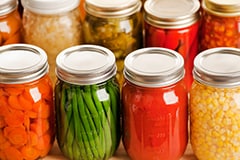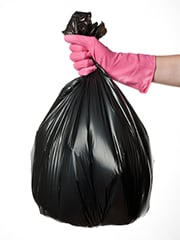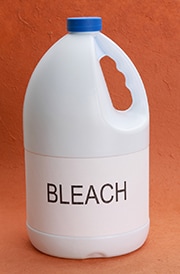Home-Canned Foods

Protect Yourself from Botulism
Foodborne botulism is a rare but serious illness caused by eating foods that are contaminated with the disease‑causing toxin. You cannot see, smell, or taste botulinum toxin – but taking even a small taste of food containing this toxin can be deadly.
Click on the following tips for details on how to protect yourself and the people you feed.
Home Canning and Botulism
Know the risks of botulism from home-canned foods
Home-canned vegetables are the most common cause of botulism outbreaks in the United States. From 1996 to 2014, there were 210 outbreaks of foodborne botulism reported to CDC. Of the 145 outbreaks that were caused by home-prepared foods, 43 outbreaks, or 30%, were from home-canned vegetables. These outbreaks often occurred because home canners did not follow canning instructions, did not use pressure canners, ignored signs of food spoilage, or didn’t know they could get botulism from improperly preserving vegetables.
Use proper home canning techniques
Low-acid foods have a pH greater than 4.6. Examples of low-acid foods are:
- Asparagus
- Green beans
- Beets
- Corn
- Potatoes
- Some tomatoes
- Figs
- All meats
- Fish and seafood
- The best way to prevent foodborne botulism is by carefully following instructions for safe home canning in the USDA Complete Guide to Home Canningexternal icon.
- Use a pressure canner for low-acid foods and follow all specified home-canning processing times for safe home canning of all foods.
- Do not use an electric, multi-cooker appliance, even if it has a “canning” or “steam canning” button on the front panel. Learn moreexternal icon.
- Pay special attention to the processing times for low-acid foods (pH >4.6), which include all vegetables, some tomatoes, figs, all meats, fish, and seafood. Discard all swollen, gassy, or spoiled canned foods safely.
- Before eating home-canned tomatoes, foods containing home-canned tomatoes, or any home-canned foods that are low in acid, boil in a saucepan, even if you detect no signs of spoilage.
- At altitudes below 1,000 feet, boil foods for 10 minutes.
- Add 1 minute for each additional 1,000 feet of elevation.
- If you know foods were underprocessed according to the current standards and recommended methods, do not eat them and throw them out safely.
- After you open any canned or pickled foods, store them in the refrigerator.
- The National Center for Home Food Preservationexternal icon
- State and county extension servicesexternal icon (click on your state or scroll down for a list of all services)
- Temperatures for food preservation guideexternal icon
- Processing times guideexternal icon
- Home Canning and Botulism CDC Feature

